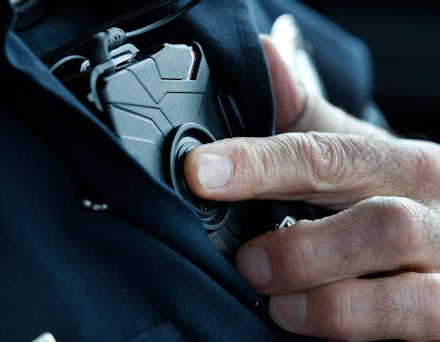If We Want to Throw Body Cameras on Every Police Officer, We're Going to Need Better Laws

Watch this officer drag a young African-American girl across a room. Watch these officers tackle a man for jaywalking. It seems like every week, there's a new video exposing abusive police officers and their excessive use of force, because now there are cameras everywhere. They're on cellphones, tablets, car dashboards and now the chests of police officers in potentially thousands of police departments across the country.
But just because you put a camera somewhere doesn't mean it will be used for the public's benefit. You need robust rules to make sure police don't do whatever they like with that footage, and that the public has access to it when they need. And when it comes to those rules, we have a long way to go.
Of all departments, one of the worst performing in terms of body-worn camera regulations is, unfortunately, Ferguson, Missouri.
A new scorecard from a consortium of major civil rights groups led by the National Leadership Council scrubbed the websites of 25 major precincts — the 15 largest in the country, plus some precincts that either have body camera programs or significant police incidences in recent memory — to find the on-the-book policies for body-worn cameras. The results ranged from nonexistent to horrible to decent.
"Every department has room to improve, even the best in the nation," Harlan Yu, principal at civil rights consulting firm Upturn, told Mic. "And especially the large departments have even further to go."
You'd think, for example, that if you were going to give a police officer a body camera, there would be clear and public rules about whether he's allowed to check that footage before he writes his report, or whether he can access it later, or how he has to store that footage. But on of those issues, most departments have no clear rules.
The scorecard below doesn't even evaluate each police department's policy — it just checks to see if there is one, and neatly collects them all in one place.
Though police departments weren't ranked relative to each other's performance, Atlanta and Ferguson came out in a clear last place, scoring red marks in nearly every category.
One of the most alarming columns on the scorecard was for a clear policy on collecting biometric data. Of all of the police precincts studied, only Baltimore had a rule prohibiting the use of body-worn camera footage, for example, for building a facial recognition database.
Police body cams aren't absolutely good unless they can be regulated. Even if body cams stoke the popular imagination in terms of catching abusive officers in the act. But body-worn cameras — which, by the way, tend to face outward toward the public more often than they do actual police — have the potential to become a tool for ubiquitous surveillance.
"I don't see any barrier for putting in facial recognition or automatic license plate readers," Elizabeth Joh, a law professor at the University of California whose research focuses on police technology, told Mic. "They're meant to be a tool of surveillance against the police, but can very easily become a tool of surveillance against the public."
Joh said this is where two modern civil rights movements — the post-Ferguson police reformers and the anti-surveillance privacy hawks — could have an unintended friction. The former typically sees body cams as a way to hold police accountable and expose brutality and prejudicial policing, and the latter is generally skeptical of cameras going up everywhere.
"There isn't a consensus in the civil rights community that all police should be wearing cameras," Yu said. "Many believe that they're a distraction, that they're expensive, and not a solution to the reform that communities need."
But the report and scorecard don't take a stance on whether body cams are necessary, or should be avoided — given the rapid rate at which departments are buying them.
"It's a practical decision to recognize that body-worn cameras are rolling out across the country," Yu said. "Departments are buying them quickly, and we keep hearing that this is the biggest trend in policing. So given that they're being rolled out, what protections need to be in place?"